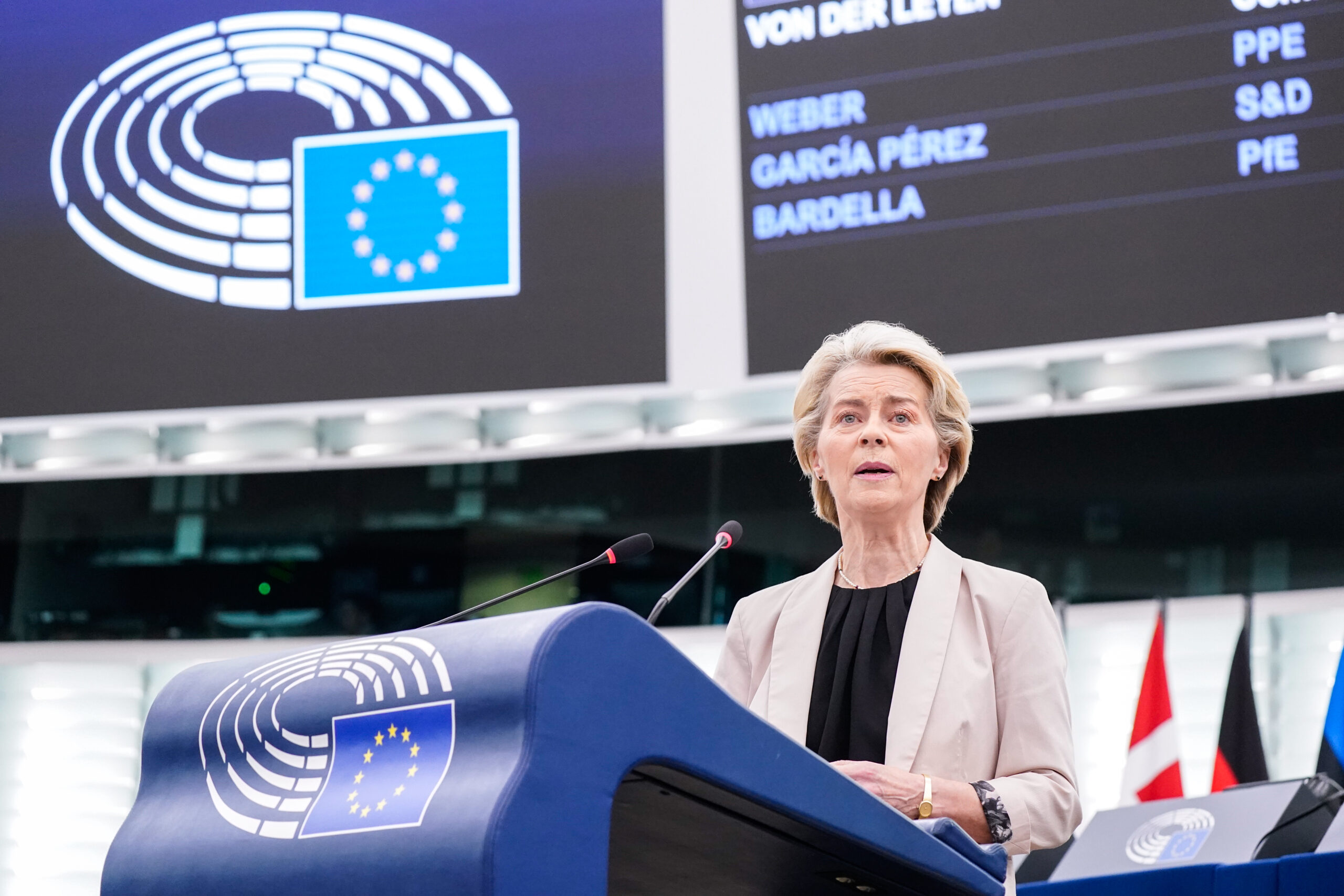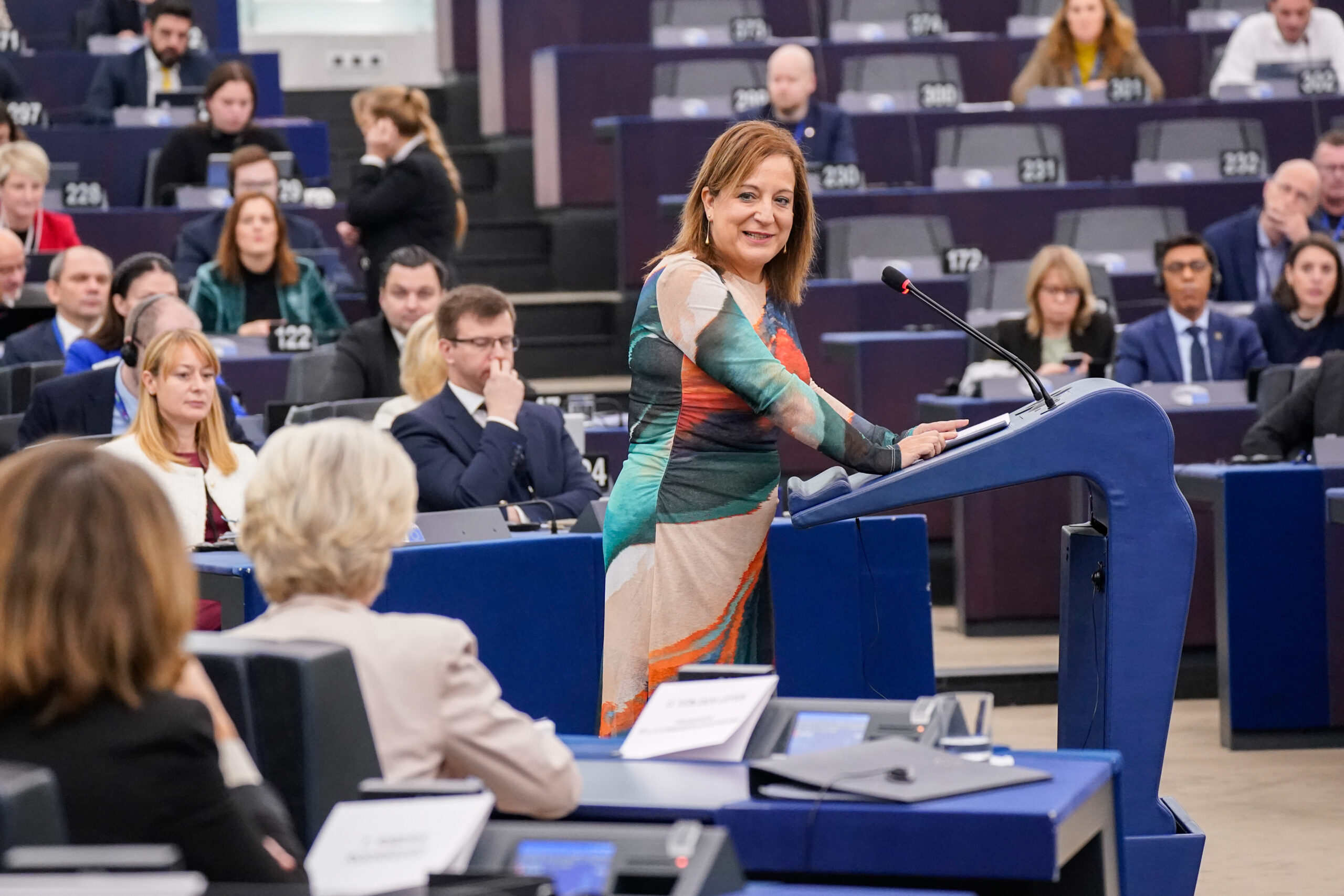Brussels – With 370 votes in favor, 282 against, and 36 abstentions, the second European Commission of Ursula von der Leyen kicks off. The weakest ever. At the European Parliament debate, the president promised that she would “always work from the center” with all the “pro-European democratic forces in this Assembly.” She announces the first initiatives that will mark the new mandate and gives the necessary guarantees to the groups supporting her. However, the reactions of the political groups and the outcome of the vote – the number of votes in favor is the lowest since the Commission was first elected – confirms once again that the pro-European majority starts on a weak footing, a victim of the People’s Party’s attempt to widen it definitively to Giorgia Meloni’s Conservatives.
As proof of her cabinet’s pro-European faith, the president of the European Commission announced that she would build the executive’s “first major initiative” around the three pillars outlined by Mario Draghi’s European Competitiveness Report. The “Competitiveness Compass” will guide Brussels’ work to close the gap with the United States and China, to combine decarbonization and competitiveness, to increase security, and reduce dependence on third countries.

In a skillful balancing act, von der Leyen reassures Greens and socialists, reiterating a commitment to maintain the goals of the European Green Deal that will become a more pragmatic Clean Industrial Deal to “be more agile and better accompany people and businesses along the way.” She lets those clamoring to reopen the debate on stopping endothermic engines to 2035 draw her in, announcing that she will directly oversee a “strategic dialogue on the future of the automotive industry,” a “European pride on which millions of jobs depend.” He promises to listen to companies “crushed by regulatory burdens,” to “streamline regulations,” and “provide legal certainty” to industry sectors.
She insists on a point she knows the majority is united, the war that “rages on the borders of Europe.” Von der Leyen argues that Russia “spends up to 9 percent of GDP on defense,” while the EU only reaches 1.9 percent. “We will present a White Paper on the future of European defense in the first 100 days,” she said because “our spending needs to increase, there is a need for a single defense market and to strengthen the industrial base.” Finally, von der Leyen acknowledges the role of the European Parliament, the guardian of popular sovereignty, whose confidence for the next five years “will need to be continuously earned.” She said she has asked his commissioners “to be more present in this plenary and in each of your committees to engage more and be more transparent.”
Weber (EPP) lays down arms, Garcia Perez (S&D): “There is an agreement, it must be respected”
After von der Leyen’s speech, the leaders of the political groups take the floor. A new chapter of the clash of the last few weeks, with a novelty: the EPP assuming the posture of the responsible group and ready to hold together all the souls of the pro-European majority. From the Greens down to the ECR. Manfred Weber shrewdly chooses to lay down his arms — or rather to point them at a new common enemy: “The AfD demanding to leave Europe, Le Pen, Orban. They are political enemies,” he tells the European Parliament. “Socialists, liberals, and populars are the founding parties of today’s Europe,” the Greens “have contributed a lot,” and conservatives also “want to strengthen Europe.”

Social Democrat group leader, Iratxe Garcia Perez speaks to Ursula von der Leyen at the House, 27/11/24
However, there’s something strange with Weber’s embrace because the EPP’s continued flirt with the far right has effectively eliminated trust among the majority groups. For Iratxe Garcia Perez, the Socialist yes vote “is not a blank check.” The warning to von der Leyen and Weber could not be more explicit: “We have an agreement among pro-European forces, and agreements must be respected. We will not accept double standards. You cannot build Europe with those who want to destroy it,” the S&D leader said in the House. A line espoused by the Liberals, the third group of the majority: group leader Valerie Hayer pointed out that today, in the European Parliament, “there are two possible majorities,” but that the one called ‘Venezuela’ – composed of the EPP, Conservatives, Patriots, and Sovereignists – “is against nature.”
The two groups with one foot in and one foot out of the majority have opposed moods. On the one side are the Greens, who, having swallowed the bitter pill of the executive vice-presidency to Raffaele Fitto and given the “guarantees obtained on the Green Deal and the rule of law,” announced that “a slim majority of the group is in favor of giving the green light to this Commission.” On the other, the Conservatives and Reformists, with Nicola Procaccini declaring with satisfaction that they have “witnessed with a certain detached amusement the psychodrama of the Left in convulsions over the vice-presidency assigned to an Italian conservative.” The MEP from the party of Prime Minister Giorgia Meloni, who is ECR group leader, pushes his own agenda by stating that “there is no majority constraint,” but that in Brussels, “fortunately majorities here are formed on content and can change with each vote.”
That leaves the far right and the radical left, which attack von der Leyen and the agreement between the majority groups. For Jordan Bardella, group leader of Patriots for Europe, the College of Commissioners comprises “anonymous, unknown characters, elected by no one,” who “in a Brussels corridor” will influence the lives of 450 million people. For Marine Le Pen’s protégé, the EU “has become the world’s sick man.” On the opposite side of the aisle, the leader of the European Left, Manon Aubry, accuses von der Leyen of having “rolled out the red carpet to the far right” by handing over the executive vice presidency to Fitto, “a post-fascist known for his corruption scandals.”
Vote crowns the weakest-ever European Commission
In the end, the only group to unanimously vote, without a single defection, for the second von der Leyen term is the liberals. Among the Populars, 25 sharp-shooters – the delegation of the Spanish Partido Popular and three Slovenian MEPs – while for the Socialists, 25 were against and 18 abstained. The PD delegation voted in favor except for Cecilia Strada and Marco Tarquinio but will “watch over the program with no discounts,” said Nicola Zingaretti. In the S&D, the French of Raphael Glucksmann voted against, and most of the German delegation abstained.
The Greens split down the middle, with Italy’s Ignazio Marino, Benedetta Scuderi, and Leoluca Orlando on the no side and the conservatives, with the 24 MEPs from Fratelli d’Italia, all in favor. The European Left, Patriots, and Europe for Sovereign Nations unanimously voted against the new commission. The League’s vote against, while in line with the Patriots’ group’s decision, highlights the friction between the government allies in Rome, with Fratelli d’Italia and Forza Italia leading the way for the European Commission’s go-ahead and the League opposing it.
The 370 votes in favor obtained by von der Leyen for her College highlight two aspects. Not only are they 31 fewer than the 401 that had decreed her confirmation as head of the European Commission in July, but the lowest result since 1995 — since the European Parliament started electing the College of Commissioners.
English version by the Translation Service of Withub
![La presidente della Commissione europea, Ursula von der Leyen, e la sua squadra di commissari in Parlamento Ue [Strasburgo, 27 novembre 2024]](https://www.eunews.it/wp-content/uploads/2024/11/vdl-2-350x250.png)



